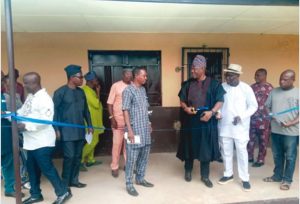
Engr. Usiagwu Arthur Osaretin is the President General of Igbanke General Union (IGU) Worldwide. In this interview with ISAAC ASABOR, he spoke on how Igbanke that once benefitted from rural electricity project in the then Midwestern State; even before the advent of the defunct NEPA, is today in darkness due to neglect by the government, and the same vein threw insight to how he and other concerned indigenes have embarked on self-developmental efforts in the bid to ensure that the community is equipped with electricity. Besides the non-electrification of the community, he also lamented the absence of basic infrastructures across the towns that made up Igbanke. Excerpts:
Before Statutory bodies concerned with electrification of communities, such as the defunct Nigeria Electric Power Authority (NEPA), Power Holding Company of Nigeria (PHCN) and now Benin Electricity Distribution Company, there was the Rural Electricity Board (REB), which served Igbanke town, particularly in the late 60s and 70s. As a community leader, don’t you think it is ironical that the entire communities in Igbanke today are in darkness; so to speak? What is your take on the retrogressive development?
I will in this parley, by virtue of your question concur with you that you have said it all with the word “Ironical”. It is truly ironic because Igbanke was electrified before Agbor, in Delta State, and which is today perceived to be more developed in terms of infrastructure.
Igbanke community is fed from Irrua 132KV Sub station. This is funny by all standards! Irrua to Igbanke is about 60 kilometers. With all the power supply losses, how do you expect stable electricity supply? For months my people have not had an hour of power supply. All businesses in Igbanke can no longer operate owing to this continuous blackout.
We have a 2x60MVA, 132/33kV substation at Agbor energised on15th March, 2016. We appeal to both the state and Federal government of Nigeria to come to the aid of Igbanke community and re-direct Igbanke electricity supply from Agbor which is about 6km away. With this approach, Igbanke will have an improved power supply.
Because of this perpetual darkness, and to keep the community going, we went ahead to launch an infrastructural project tagged, “Operation Light Up Igbanke”.
Let me say that the electricity problem in Nigeria has become hydra headed! I feel we need to think outside the box to help government in addressing this huge deficit. We can make fifty percent of our energy need off grid. I have canvassed in different fora that there is need for government to apply the energy mix approach as well as the embedded generation option in solving our electricity issues across the country. As a result of the epileptic electricity supply to my community, we decided to look inwards to address the continuous darkness across the streets of Igbanke. The town is an urban community with all the trappings of an emerging city.
Today, through self-help, we are strategically changing the landscape and turning the Community into a big city through solar intervention across all major streets and government facilities across the community. The General hospital is now a beneficiary just like the divisional Police headquarters. This approach is just a palliative as a stop gap while we wait upon our government and NDDC to do the needful. Igbanke is in an oil producing Local Government and we appeal to NDDC to look into our direction.
Some of our traditional institutions are already having a fair share of this infrastructural metamorphosis. Some of our well-meaning Igbanke sons and daughters are aligning with me to achieve our set target. It is my hope that others will follow in this drive to change the face of the community for the better
You are so concerned about electrification of Igbanke communities. What can you say is the motivation, or rather, what is the driving force?
The importance of rural electrification in all the communities that made up Igbanke will unarguably engender effective socio-political awareness; enhance changes in the community GNP and economic growth. More micro industries will spring up, artisans will improve their trade and there will be general boom in the economy of the community.
Again, do not forget that several indigenous entrepreneurs have started springing up in the communities, and virtually all of them have the financial capacity to trigger industrial revolution across the communities; that is in form of offspring of Small Scale industries and Agro-Allied Industries. Personally, in my own projection, some of them have the wherewithal to invest in mechanised farming and irrigation pilot schemes. And you know, for such project to yield commendable Return On Investment (ROI), there must be adequate and uninterrupted electricity. Not only that, electrification of the communities will reduced rural-urban drift as well as engender Information Technology at the doorstep of the people.
Let me also add that it would facilitate advancement in the method of learning and help in educating the students as it would pave the way for standardisation in laboratory/workshop tools and equipment.
As I speak, electrification of Igbanke communities will bring a lot of benefits to the people. I have not told you that it would enhance the health sector, particularly Igbanke General Hospital which has for ages being encumbered by non-availability of electricity.
Against the backdrop of this parley, it is obvious that Igbanke community is been neglected by the government, besides the area of electrification, which other areas can you identify to have being neglected by the government?
Frankly speaking, my people have been lamenting over the neglect by the state government. They have been complaining about the abandonment of the General Hospital, and the deplorable condition of virtually all public schools built by the state as they are fast dilapidating in the same pace with other basic infrastructures; where they are available. To aptly put it, we are being neglected. To worsen the situation, government’s abandonment of the hospital has been causing avoidable deaths within the communities, in the absence of health facilities. Igbanke General Hospital serves the 6 communities that made up Igbanke and other communities within Igbanke environs. We only have one doctor and three nurses taking care of over 120,000 people.
Take a visit to Omolua Primary School, you will see our children without roof on their head, this is the height of neglect!
We need to feel government impact and I am hopeful that Edo State Government will come to the aid of Igbanke community without further delay.

